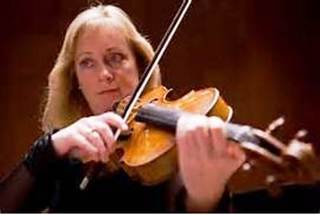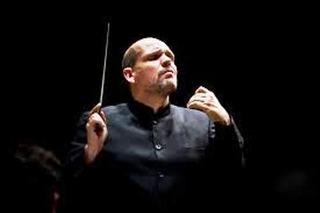|
Back
Viola Without Jokes New York
David Geffen Hall, Lincoln Center
11/17/2016 - & November 18, 19, 2016
Richard Wagner: Prelude to Act I of Lohengrin
Julia Adolphe: Unearth, Release (Concerto for Viola and Orchestra)
Pyotr Ilyich Tchaikovsky: Symphony No. 4 in F minor, Opus 36
Cynthia Phelps (Viola)
New York Philharmonic Orchestra, Jaap van Zweden (Conductor)

C. Phelps (© NJ.com)
Last night’s New York Philharmonic concert was a tribute to two distinguished Dutch artists. First, even before the entrance of the conductor, the wonderful, radical, politically savvy composer Louis Andriessen was given the prestigious KravisPrize. The money awarded to the composer is quite substantial–but the important thing is that Mr. Andriessen, who made his appearance on the stage, will be writing a work for the Phil, and one awaits it with alacrity.
The second citizen of Holland was conductor Jaap van Zweden, his first appearance since being appointed Music Director for the 2018-19 season. And this initial concert was a pretty distinguished one.
Mr. van Zweden is a tough but disciplined man with a stick. I don’t know his reputation with the Dallas Symphony, but friends in the Hong Kong Philharmonic, where he will continue as Music Director, are impressed not only with his skill but his patience, professional and gracious attitude.
As a one-time Concertmaster (the youngest in the history of the Royal Concertgebouw Orchestra), he obviously knows his strings. And the opening bars of the Lohengrin prelude were played with the usual sheen by the violins. More that usual, one could hear the Wagner partitions, and the crescendo was played with dignity, skill and the discipline one would expect from a West European conductor.
The end of the concert was a crowd-pleaser, Tchaikovsky’s Fourth Symphony. The first three movements were played with the usual non-idiosyncratic timings. It wasn’t especially Russian, perhaps, but one could put up with that. It is still a work which, even in its more stolid movements, shows a composer winning his wrestling match with Fate.
That wasn’t true in the finale. Yes, Tchaikovsky calls for fury and fire. But he also describes it as “a picture of festive merriment.” Well, under Mr. van Zweden’s baton, he must have meant merriment for the Kentucky Derby. He took the Phil at a pace which far outpaced mere fire. Thus, it lacked profile, structure, it lacked anything even approaching breathing space. Oh, it attracted the standup applause from an audience which spontaneously arises for breathless music. And the New York Philharmonic can handle even the most volcanic pacing. But this was showoff stuff, with hardly a look back at the composer.

J. van Zweden (© IMGArtists)
For those of us expecting Mr. van Zweden to shun our own century, we had a surprise. A quite gorgeous one. Julia Adolphe, only in her mid-20’s, is not only proficient and prodigious, but she has a mastery of orchestration and vocal works.
Here, though, her meat was the viola. Specifically the viola of Cynthia Phelps, whose performance of the Mozart Sinfonia concertante some years ago, was one of the most stunning I had ever heard.
Ms. Adolphe attached a program to her Unearth, Release concerto, but that was hardly needed. She wears her emotions on her music paper, and nobody could mistake the feelings she displayed here. The first movement was pure anger. Ms. Phelps started on the lowest strings of her instrument and gave a tempestuous reading with blurts and moderated screams from the orchestra. Whatever Ms. Adolphe was experiencing when she wrote it, I would hate to be in the same room!
The next movement was more of a real furioso than the preceding Tchaikovsky, a moto perpetuo for Ms. Phelps, a short trenchant “fun” section.
The finale was pure bliss. Julia Adolphe can be a romantic when she chooses. And Cynthia Phelps, the longtime First Viola of the Philharmonic, has the most glowing tones. This was a movement of many moods. But its final measures were notated and played with a quiet passion, a comforting warmth, a resolution to an intelligent and vivid picture.
Harry Rolnick
|